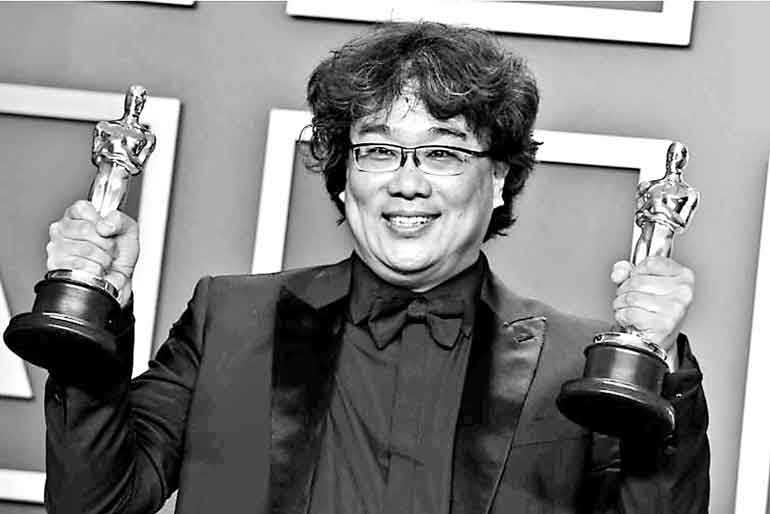Monday Feb 23, 2026
Monday Feb 23, 2026
Saturday, 15 February 2020 00:15 - - {{hitsCtrl.values.hits}}

The success of ‘Parasite’ at the Oscars was a personal triumph for South Korean film maker Bong Joon-ho

Cinematic history was made on 9 February at the Dolby Theatre in Los Angeles where the 92nd awards ceremony of the Academy of Motion Picture Arts and Sciences (AMPAS) was held. For the first time in its ‘nonagenarian’ lifetime, the Academy award known as Oscar was presented to a non-English film in the prestigious Best Picture category.
The recipient of this singular honour was the Korean film ‘Gisaengchung’ known to the world at large in English as ‘Parasite’. In addition to the Best Picture award, ‘Parasite’ also won Oscars in the Best Director, Best Original Screenplay and Best International Feature Film categories.
The Oscar for the Best Picture has been in existence from the time the academy awards event commenced in 1929. Initially it was known as the Best Outstanding Production. The change to Best Picture came in 1962. Although the nominations for Best Picture have been preponderantly from English language films, there have been 11 non-English language film nominations so far. Among such films nominated were ‘Grand Illusion,’ ‘Z,’ ‘Cries and Whispers,’ ‘Crouching Tiger, Hidden Dragon,’ ‘Babel’ and ‘Roma’. They were directed by Jean Renoir, Costa-Gavras, Ingmar Bergman, Ang Lee, Alejandro Gonzalez Inarittu and Alfonso Cuaron respectively.

However none of these films made by eminent directors ever won the Best Film award until ‘Parasite’ came along. By winning the award for 2019, the South Korean film ‘Parasite’ and its director Bong Joon-ho have finally shattered the formidable glass ceiling.
A personal triumph
The success of ‘Parasite’ at the Oscars was a personal triumph for South Korean film maker Bong Joon-ho. The film was nominated in six ‘Best’ categories at this year’s Oscar awards. They were for Film Editing, Production Design, Original Screenplay, Director, International Feature and Picture. The film which won in four out of six nominated categories lost in only the categories of Editing and Production design.
Bong Joon-ho who won the Best Director award also won the Best Original Screenplay award along with Han Jin-won. Bong who wrote the story of ‘Parasite’ co-authored the screenplay with Han Jin-won. With ‘Parasite,’ of which he was co-producer, winning Best International Feature film and Best Film awards, Bong Joon-ho’s tally was initially hailed as four Oscars on one night. Only the legendary Walt Disney had achieved this in 1953. However it was clarified later that the tally was only three.
Apparently according to new Oscar award rules the International Feature film award though accepted by the director was credited to the country and not to an individual. Incidentally the name of the award category was changed from Best Foreign Film to Best International Feature film only from this year.
Winning three Oscar statuettes on one night places Bong Joon-ho in the same league with nine other illustrious film makers. The nine others who have won three Oscars for one film in one night and their films are James L. Brooks (‘Terms of Endearment’), James Cameron (‘Titanic’), the Coen brothers (‘No Country for Old Men’), Francis Ford Coppola (‘The Godfather Part II’), Alejandro González Iñárritu (‘Birdman’), Peter Jackson and Fran Walsh (‘The Lord of the Rings: The Return of the King’) and Billy Wilder (‘The Apartment’).
Bong Joon-ho’s beginnings
Bong Joon-ho was born in 1969 as the youngest of four children in South Korea’s Daegu city. His father was a professor and mother a housewife. The family later re-located to South Korea’s capital city – Seoul. Bong graduated from Yonsei university with a degree in Sociology. While an undergraduate he had completed two years of mandatory service in the Army as required by Korean law. Thereafter he joined the Korean academy of film arts and completed a two-year course in film making.
Bong Joon-ho then spent five years in films working for other directors in different capacities such as actor, writer, cinematographer and assistant director. He also made several short films. His first directorial venture in feature films was in 2000 when he made ‘Barking Dogs Seldom Bite’. Bong followed this up by directing more films like ‘Memories of Murder,’ ‘The Host,’ ‘Mother,’ ‘Snowpiercer,’ ‘Okja’ and now ‘Parasite’. The director mainly films stories written by him personally and very often writes or collaborates in scripting the screenplay. Interestingly enough the films ‘Snowpiercer’ and ‘Okja’ are classified as English language films.
Stiff competition
Bong Joon-Ho had stiff competition in being crowned with the Best Director laurel. Those in the running with him were Martin Scorcese (‘The Irishman’), Quentin Tarantino (‘Once Upon a Time in Hollywood’), Sam Mendes (‘1917’) and Todd Philips (‘Joker’). Bong Joon-ho seemed genuinely surprised to win the directorial award. His acceptance speech sounded very sincere and touched the gathering at the venue as well as millions of viewers on TV.
“After winning Best International Feature, I thought I was done for the day and was ready to relax. Thank you so much. When I was young and studying cinema, there was a saying that I carved deep into my heart, which is that, ‘The most personal is the most creative.’ That quote is from our great Martin Scorsese,” said Bong Joon-ho, pointing to Martin Scorcese in the audience. “When I was in school, I studied Martin Scorsese’s films. Just to be nominated was a huge honour. I never thought I would win.” An emotional Martin Scorcese stood up amidst deafening applause and acknowledged Bong.
The Korean director then went on to say: “When people in the US were not familiar with my films, Quentin always put my films on his list. He’s here, thank you so much. Quentin, I love you.” Quentin Tarantino smiled and waved.
Bong continued by saying: “And Todd (Philips) and Sam (Mendes), great directors that I admire. If the Academy allows, I would like to get a Texas chainsaw, split the award into five and share it with all of you. Thank you. I will drink until next morning, thank you.”
Multi-award winning commercial success
Apart from the Oscar bonanza, ‘Parasite’ has struck gold by winning many other international accolades too. It won the Palme d’Or at the prestigious Cannes Film festival in 2019 with the Jury voting unanimously. ‘Parasite’ also received three nominations for the Golden Globe awards and became the first Korean film to win in the Best Foreign Film category. The film also got the Screen Actors Guild Award for Outstanding Performance by a Cast in a Motion Picture. ‘Parasite’ received four nominations at the 73rd British Academy Film Awards (BAFTA) and won two awards for Best Foreign Language Film and Best Original Screenplay.
While being critically acclaimed, the film was also a worldwide commercial success. The 132-minute-long film premiered at the Cannes festival on 21 May 2019. It was released nine days later in Korea on 30 May 2019. The film made on a budget of $ 11 million had as of 9 February grossed $ 175.9 million worldwide. Of this the box office earnings in South Korea was $ 72 million while the USA and Canada combined topped $ 36 million. With the Oscar win the film is going to be re-released in thousands of cinemas from this weekend. This obviously would result in gaining more revenue.


What makes ‘Parasite’ tick?
What is it that makes ‘Parasite’ tick? The film starring popular Korean artistes Song Kang-ho, Lee Sun-kyun, Cho Yeo-jeong, Choi Woo-shik and Park So-dam is described as a dark comedy thriller about class contradictions in contemporary urban South Korea. Not wishing to be a spoiler, I will not delve into too much of detail about the story and stick only to a vague outline.
The film is basically about two sets of families. One very rich and the other poor. There is also a third very poor family. The rich family resides in a luxurious mansion while the poor family lives in a squalid basement. The third is in a secret sub-basement.
The family striving for upward mobility gets a chance to go up in the world when an employment opportunity in the form of tutor to the daughter in the rich family household offers itself to the son in the poor family. He grasps it with the aid of fraudulent university qualifications. Thereafter the family slowly infiltrates the upper class mansion through deceit and false pretences. All four members of the poor family are now ensconced in the rich household serving the elitist family in different capacities. In the process they displace another poorer family eking out a living in the same way as domestic aides.
At one stage the rich family is away on vacation and the poor family enjoying full freedom act as if they are lords of the manor. The rich family returns earlier than expected and the poor family is brought down to earth. Realisation dawns that the status quo will not change. The earlier hilarious easy-going sequences of the film give way to serious, dark scenes inclusive of violence. Ultimately the son who aspired to ascend “upstairs” with his family from their original abode returns home and descends “downstairs” to the basement.
Intriguing title
The title of the film is most intriguing. Director Bong Joon-ho in a media interview spoken about the choice of ‘Parasite’ as the film’s title. Here is the relevant excerpt: “It was considered almost a little risky and dangerous. Particularly the marketing team was pretty hesitant because, in Korea, the word ‘parasite’ has a very realistic and negative connotation.”
Joon-ho went on to explain that the title could be perceived in a couple of different ways, as it has a metaphorical double-meaning that could refer to either of the two central families in the South Korean dark-comedy thriller.
“Because the story is about the poor family infiltrating and creeping into the rich house, it seems very obvious that ‘Parasite’ refers to the poor family, and I think that’s why the marketing team was a little hesitant,” he explained. “But if you look at it the other way, you can say that the rich family, they’re also parasites in terms of labour. They can’t even wash dishes, they can’t drive themselves, so they leech off the poor family’s labour. So both are parasites.”
The film relates mainly to social inequality and the class divide where the under privileged, marginalised sections of society can only dream of a better life through upward mobility. Bong Joon-ho brings this stark reality to life through his film. The contrast between the two classes – the haves and the have-nots – is illustrated powerfully through the “heavenly” mansion and the “hellish” basement. Bong also uses stairs and staircases as a vivid metaphor in many scenes. They indicate ascension and descension between the bottom layer “downstairs” and top level “upstairs”.
Reflecting contemporary South Korean society
An important aspect about the internationally-praised ‘Parasite’ is that the film has been a tremendous commercial success in its home and native land of South Korea too. Several reviewers, critics and commentators have attributed this success to the fact that ‘Parasite’ reflects contemporary South Korean society effectively. Bong through his black humour narrative has spotlighted both the desperate ambition of the “lower” classes and the shallow superficiality of the “upper” classes.
South Korea boasts of being the fourth largest economy in Asia and the 11th biggest economy in the world. However, there is enormous inequality in incomes. There is immense class conflict among the privileged, less privileged, underprivileged and marginalised sections of society. Korean sociologists describe the prevalent mood of society as “a feeling of unresolved resentment against injustices suffered, a sense of helplessness because of the overwhelming odds”.
It is against this backdrop that Bong Joon-ho’s ‘Parasite’ appeals to Koreans. They see the reality of life reflected in the film through the prism of dark humour. This is the main reason for the success enjoyed by ‘Parasite’ in Korea and its global reception.
South Korea has in recent times undergone a renaissance in film making. Over 200 films are produced annually. The Busan International Film Festival has become Asia’s most important film festival. Moreover Korean films have begun to exert great influence over film makers in Asia. For instance many films made in India are adapted or inspired by Korean films.
In that context the Oscar harvest of ‘Parasite’ will certainly provide a boost to Korean cinema and take it to greater heights. It would also infuse confidence and hope into many filmmakers of non-English language films that their creations too have a chance of winning a Best Picture Oscar in the future.
(D.B.S. Jeyaraj can be reached at [email protected])